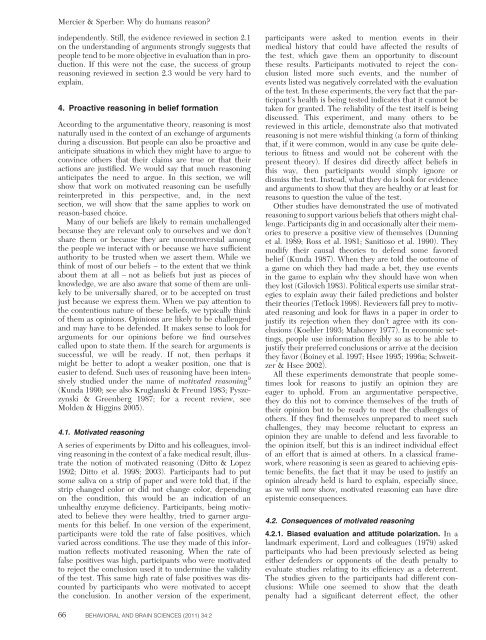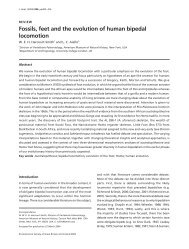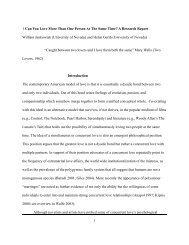Why do humans reason? Arguments for an argumentative theory
Why do humans reason? Arguments for an argumentative theory
Why do humans reason? Arguments for an argumentative theory
Create successful ePaper yourself
Turn your PDF publications into a flip-book with our unique Google optimized e-Paper software.
Mercier & Sperber: <strong>Why</strong> <strong>do</strong> <strong>hum<strong>an</strong>s</strong> <strong>reason</strong>?independently. Still, the evidence reviewed in section 2.1on the underst<strong>an</strong>ding of arguments strongly suggests thatpeople tend to be more objective in evaluation th<strong>an</strong> in production.If this were not the case, the success of group<strong>reason</strong>ing reviewed in section 2.3 would be very hard toexplain.4. Proactive <strong>reason</strong>ing in belief <strong>for</strong>mationAccording to the <strong>argumentative</strong> <strong>theory</strong>, <strong>reason</strong>ing is mostnaturally used in the context of <strong>an</strong> exch<strong>an</strong>ge of argumentsduring a discussion. But people c<strong>an</strong> also be proactive <strong>an</strong>d<strong>an</strong>ticipate situations in which they might have to argue toconvince others that their claims are true or that theiractions are justified. We would say that much <strong>reason</strong>ing<strong>an</strong>ticipates the need to argue. In this section, we willshow that work on motivated <strong>reason</strong>ing c<strong>an</strong> be usefullyreinterpreted in this perspective, <strong>an</strong>d, in the nextsection, we will show that the same applies to work on<strong>reason</strong>-based choice.M<strong>an</strong>y of our beliefs are likely to remain unchallengedbecause they are relev<strong>an</strong>t only to ourselves <strong>an</strong>d we <strong>do</strong>n’tshare them or because they are uncontroversial amongthe people we interact with or because we have sufficientauthority to be trusted when we assert them. While wethink of most of our beliefs – to the extent that we thinkabout them at all – not as beliefs but just as pieces ofknowledge, we are also aware that some of them are unlikelyto be universally shared, or to be accepted on trustjust because we express them. When we pay attention tothe contentious nature of these beliefs, we typically thinkof them as opinions. Opinions are likely to be challenged<strong>an</strong>d may have to be defended. It makes sense to look <strong>for</strong>arguments <strong>for</strong> our opinions be<strong>for</strong>e we find ourselvescalled upon to state them. If the search <strong>for</strong> arguments issuccessful, we will be ready. If not, then perhaps itmight be better to a<strong>do</strong>pt a weaker position, one that iseasier to defend. Such uses of <strong>reason</strong>ing have been intensivelystudied under the name of motivated <strong>reason</strong>ing 9(Kunda 1990; see also Krugl<strong>an</strong>ski & Freund 1983; Pyszczynski& Greenberg 1987; <strong>for</strong> a recent review, seeMolden & Higgins 2005).4.1. Motivated <strong>reason</strong>ingA series of experiments by Ditto <strong>an</strong>d his colleagues, involving<strong>reason</strong>ing in the context of a fake medical result, illustratethe notion of motivated <strong>reason</strong>ing (Ditto & Lopez1992; Ditto et al. 1998; 2003). Particip<strong>an</strong>ts had to putsome saliva on a strip of paper <strong>an</strong>d were told that, if thestrip ch<strong>an</strong>ged color or did not ch<strong>an</strong>ge color, dependingon the condition, this would be <strong>an</strong> indication of <strong>an</strong>unhealthy enzyme deficiency. Particip<strong>an</strong>ts, being motivatedto believe they were healthy, tried to garner arguments<strong>for</strong> this belief. In one version of the experiment,particip<strong>an</strong>ts were told the rate of false positives, whichvaried across conditions. The use they made of this in<strong>for</strong>mationreflects motivated <strong>reason</strong>ing. When the rate offalse positives was high, particip<strong>an</strong>ts who were motivatedto reject the conclusion used it to undermine the validityof the test. This same high rate of false positives was discountedby particip<strong>an</strong>ts who were motivated to acceptthe conclusion. In <strong>an</strong>other version of the experiment,particip<strong>an</strong>ts were asked to mention events in theirmedical history that could have affected the results ofthe test, which gave them <strong>an</strong> opportunity to discountthese results. Particip<strong>an</strong>ts motivated to reject the conclusionlisted more such events, <strong>an</strong>d the number ofevents listed was negatively correlated with the evaluationof the test. In these experiments, the very fact that the particip<strong>an</strong>t’shealth is being tested indicates that it c<strong>an</strong>not betaken <strong>for</strong> gr<strong>an</strong>ted. The reliability of the test itself is beingdiscussed. This experiment, <strong>an</strong>d m<strong>an</strong>y others to bereviewed in this article, demonstrate also that motivated<strong>reason</strong>ing is not mere wishful thinking (a <strong>for</strong>m of thinkingthat, if it were common, would in <strong>an</strong>y case be quite deleteriousto fitness <strong>an</strong>d would not be coherent with thepresent <strong>theory</strong>). If desires did directly affect beliefs inthis way, then particip<strong>an</strong>ts would simply ignore ordismiss the test. Instead, what they <strong>do</strong> is look <strong>for</strong> evidence<strong>an</strong>d arguments to show that they are healthy or at least <strong>for</strong><strong>reason</strong>s to question the value of the test.Other studies have demonstrated the use of motivated<strong>reason</strong>ing to support various beliefs that others might challenge.Particip<strong>an</strong>ts dig in <strong>an</strong>d occasionally alter their memoriesto preserve a positive view of themselves (Dunninget al. 1989; Ross et al. 1981; S<strong>an</strong>itioso et al. 1990). Theymodify their causal theories to defend some favoredbelief (Kunda 1987). When they are told the outcome ofa game on which they had made a bet, they use eventsin the game to explain why they should have won whenthey lost (Gilovich 1983). Political experts use similar strategiesto explain away their failed predictions <strong>an</strong>d bolstertheir theories (Tetlock 1998). Reviewers fall prey to motivated<strong>reason</strong>ing <strong>an</strong>d look <strong>for</strong> flaws in a paper in order tojustify its rejection when they <strong>do</strong>n’t agree with its conclusions(Koehler 1993; Mahoney 1977). In economic settings,people use in<strong>for</strong>mation flexibly so as to be able tojustify their preferred conclusions or arrive at the decisionthey favor (Boiney et al. 1997; Hsee 1995; 1996a; Schweitzer& Hsee 2002).All these experiments demonstrate that people sometimeslook <strong>for</strong> <strong>reason</strong>s to justify <strong>an</strong> opinion they areeager to uphold. From <strong>an</strong> <strong>argumentative</strong> perspective,they <strong>do</strong> this not to convince themselves of the truth oftheir opinion but to be ready to meet the challenges ofothers. If they find themselves unprepared to meet suchchallenges, they may become reluct<strong>an</strong>t to express <strong>an</strong>opinion they are unable to defend <strong>an</strong>d less favorable tothe opinion itself, but this is <strong>an</strong> indirect individual effectof <strong>an</strong> ef<strong>for</strong>t that is aimed at others. In a classical framework,where <strong>reason</strong>ing is seen as geared to achieving epistemicbenefits, the fact that it may be used to justify <strong>an</strong>opinion already held is hard to explain, especially since,as we will now show, motivated <strong>reason</strong>ing c<strong>an</strong> have direepistemic consequences.4.2. Consequences of motivated <strong>reason</strong>ing4.2.1. Biased evaluation <strong>an</strong>d attitude polarization. In al<strong>an</strong>dmark experiment, Lord <strong>an</strong>d colleagues (1979) askedparticip<strong>an</strong>ts who had been previously selected as beingeither defenders or opponents of the death penalty toevaluate studies relating to its efficiency as a deterrent.The studies given to the particip<strong>an</strong>ts had different conclusions:While one seemed to show that the deathpenalty had a signific<strong>an</strong>t deterrent effect, the other66 BEHAVIORAL AND BRAIN SCIENCES (2011) 34:2




